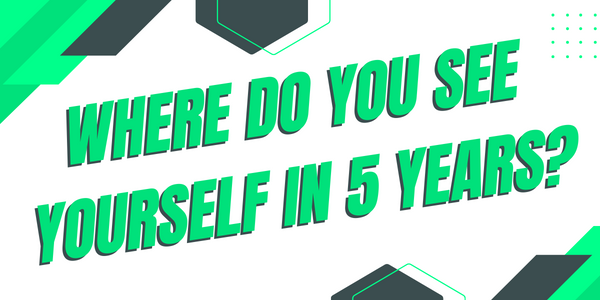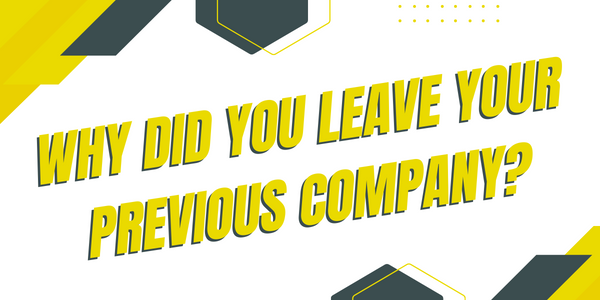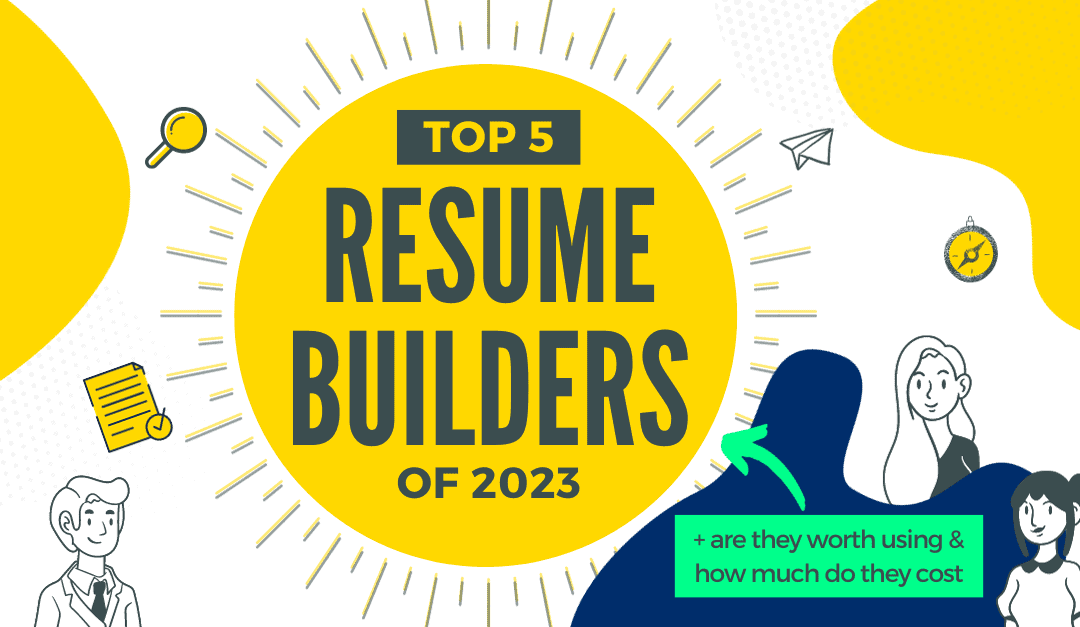
3 Tough Interview Questions and How to Answer Them Without Flinching
There are very few moments in life where you can earn $30,000 just by answering a question correctly. Most of us will never have the opportunity to be a contestant on Chopped, Jeapordy, or Who Wants to Be a Millionaire.
But, where we do get a chance to be a "contestant" is on a job interview.
Unfortunately, just like on the game shows, there are certain questions asked during the interview process that are meant to trick us.
In this post I’ll share 3 trick interview questions that you’re very likely to be asked. I’ll explain:
- What the question is actually asking
- How to answer the trick question
- And an example answer you can steal and use
Alright, let’s jump into 3 tough interview questions and answers you should know:

Tough Interview Question #1 —Where do you see yourself in 5 years?
Actual question: If we hire you are you going to leave us in a year?
On the surface this seems like a very innocent question, but it’s actually one of the easiest questions to screw up.
To be honest, this question isn’t really fair. I mean how many of us actually know where we want to be in 5 years?
Maybe you do, maybe you don’t. But, regardless of whether you actually know what you want to do, there’s generally one “correct” way to answer this.
When an interviewer asks you this tricky interview question, what they actually want to know is how long you plan to stay at the company.
This is a totally reasonable concern.
After all, according to HR Dive, when an employee leaves a company it costs the company about 33% of that employees salary to find a replacement.
This means if you’re earning $45,000/year, it will cost the company about $15,000 when you leave.
Also, like we talk about in Chapter 1 in the free Accelerated Resume Course, a recruiter is compensated only if an employee stays at a company for a certain amount of time.
So, if a recruiter asks you this question, they want to know will you be a safe bet that they’ll get paid. If a manager asks you this interview question, they want to know if you’ll help them create a stable team.
👉 With that in mind, your answer to this somewhat difficult interview question should include:
- What responsibilities you’d like to expand to in the future
- How you plan to upskill yourself over time
- What larger contributions you hope to make at the company
Here is an example of an answer to this interview question for a marketing role:
“I feel like I have a very strong grasp of how to run Facebook ad campaigns at the moment, but I’d like to expand into other channels as well. I’ve always wanted to learn how to create video ads and I’m actually taking some video editing courses at the moment. I’m hoping that in the future I would be able to handle all our marketing channels once I’m ready, but I know it’ll take some time.”
Notice that the answer shows how the person is already taking initiative to upskill and learn new things.
Also notice that they don’t make any mention of getting promoted super quickly, becoming an executive, etc. Although it’s good to have high ambitions, you also want to make sure you convey that you won’t leave just because you’re not getting promoted.

Tough Interview Question #2 — Can you explain why you left your previous company?
Actual question: are there any red flags I should be aware of?
This is one of the more feared interview questions, but it actually shouldn’t be. What a manager is actually looking for when asking this question is whether there are any red flags about you they should know about.
You would be surprised by how many people fall right into this trap and create red flags where there shouldn’t be any.
For this reason, this question is best answered quickly and succinctly (See our interview timer in the free Interviewing for Introverts course for more info on how to keep your answers brief).
👉 Things you should AVOID when answering this tough interview question:
- DON’T go into work conflicts
- DON’T talk about having a bad manager
- DON’T discuss lack of promotions or career progression
Basically you want to avoid anything that could potentially portray you as being difficult.
Even if you know that you’re not difficult, it can be very easy for someone to misinterpret your answer to this tricky interview question, which is why it’s best to answer it succinctly and without much detail.
Here is an example of an answer to this tough interview question for someone who had a bad manager:
“I really enjoyed working at my previous company, but I felt like I couldn’t really grow in my role. We tended to move very slowly and I always felt like I was discouraged from taking on additional responsibilities by my manager. From what I understand, you guys have a pretty fast paced and collaborative work culture here?”
Notice how there’s not mention of a bad or draconian manager (even though that may have been what was actually the case).
Whatever your reason for leaving the previous company, you want to make sure you don’t badmouth or blame them for your departure. Whenever possible you want to highlight a positive quality of yourself that simply didn’t fit into the company culture.
For example, if you’re interviewing for a big company, you can say that the previous company didn’t have the resources to execute big ideas.
If you’re interviewing for a small startup, on the other hand, you can say that the previous company couldn’t move fast enough.
Either way, you want to frame your answer so that the person you’re interviewing with can say, “O you won’t have that problem here!”

Tough Interview Question #3 — What are you weaknesses?
Actual question: How honest and self aware are you?
This is a classically difficult interview question and one that you’ll surely run into. In essence this question is serves two purposes:
- It’s a lie detector test to see how honest you’re being during the interview
- It’s a self-awareness test to see whether you’re aware of your blindspots
The worst thing you can do when answering this tough interview question is to give a fake answer like, “sometimes I work too hard.”
This fails both criteria above and will immediately detract from any of the other answers you give during the interview.
👉 Instead, your answer to this tricky interview question should include:
- A real weakness in ability that isn’t crucial to the job
- How you’ve compensated for this weakness in the past
- How you plan to continue to improve on this
Here is an example of an answer to this tough interview question for a someone who has poor attention to detail (like me):
“One thing that I’ve been working on is my attention to detail. Sometimes I get so excited about the project I’m working on that I’ll go into tunnel vision and will miss certain details. Over the years I’ve compensated for this by asking a coworker to look over my work with a second pair of eyes. I do realize that can be a pain so I’m also looking into this writing tool that helps scan your work for grammar and spelling. Do you guys currently have a process for ensuring quality control in the content you put out?”
Notice that in the answer above I covered all 3 aspects of the weakness: what the weakness is, how I’ve already worked on it, and how I plan to continue to improve upon it.
Expert hiring manager, Adam Broda, from Broda Coaching explains that honesty is key to answering this tricky question:
“This answer often shows your self-awareness and trustability…so give something real (but choose your words carefully). Weakness can be worked on, so make sure to add what you’re doing to improve.”
👉 Remember: everyone has weaknesses. Weaknesses can be forgiven, but inauthenticity cannot.
Giving a real answer to this question will do you more good than any contrived lie ever will.
Takeaways & Next Steps
As you prepare answers to these tough interview questions, it’s important to remember that the person you’re talking with has interviewed dozens (if not hundreds) of job candidates.
As such, they’ve heard hundreds of different replies to these questions. But, no matter how many replies they’ve heard, they’re always looking for one thing: a positive attitude.
Whether you’ve been laid off, had a bad manager, or had work conflicts, what will always shine through is how you’ve reacted to your previous experiences.
Keeping your answers positive is always the best policy when answering tough interview questions.
If you’d like to learn more about how to navigate each of the 4 stages of the interview process, remember you can always join our free interview course here.
Get 1-on-1 Help
Need to land your job ASAP? Fast forward your job search with some 1-on-1 help! 👇
More from the blog:

Best Resume Builders of 2023 (Pros & Cons + Prices)
Modern resume builders use AI, ATS-friendly templates, and active recommendations to help you build your perfect resume faster than ever before. In this post we’ve rounded up the 5 best resume builders of 2023.
How to Beat the ATS in 25 Minutes | The Ultimate Guide
In this guide I’ll show you how to beat the ats (applicant tracking system), plus I’ll give you 2 ATS-friendly resume templates and a free tool to test if your resume is ATS-friendly.
Like this? Try our free courses!
Tired of sending your job applications into a black hole and never hearing back? Get hired faster with our guided courses all for FREE!
Bogdan Zlatkov is the Founder of GHYC and author of "The Ultimate Guide to Job Hunting", ranked #1 on Google. He has been featured in the Wall Street Journal, Fast Company, HR Dive, and more. At GHYC, Bogdan creates job search courses & tools by working with award-winning career coaches, best-selling authors, and Forbes-Council members. Prior to GHYC, Bogdan led the content programs at LinkedIn Learning.
